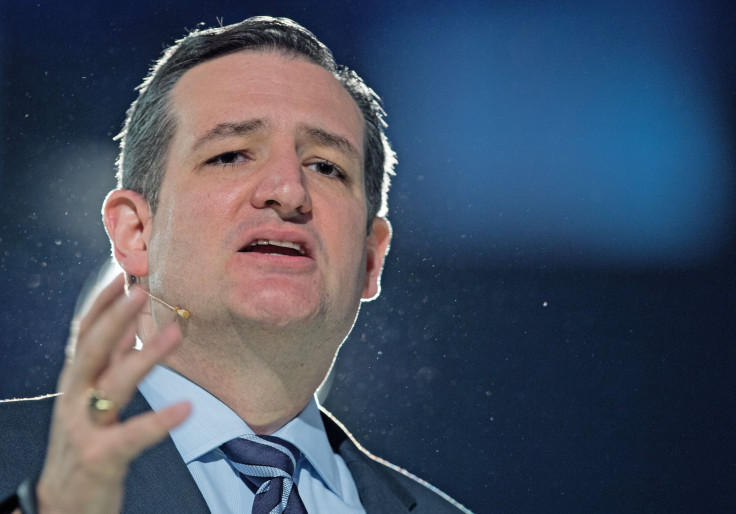Election 2016: Can Ted Cruz Win The Conservative Mantle?

WASHINGTON -- If Ted Cruz wants to win the Republican primary, first he’s going to have to win an internal battle in the GOP’s right wing to be the conservative candidate of choice. He’s going to face a lot of competition -- Mike Huckabee, Rick Santorum and Scott Walker, to name a few. But his best shot at beating Jeb Bush -- or whoever ends up the establishment candidate of choice -- will be to get the tea party wing of the GOP behind him and no one else.
Speaking to a boisterous crowd at evangelical Liberty University in Lynchburg, Virginia, Cruz made clear that he’s hoping to capitalize on conservative enthusiasm and build a campaign off grassroots support instead of the backing of monied political interests or the party establishment. “The answer will not come from Washington,” the Texas senator said. “It will come only from the men and women across this country.”
Cruz came out swinging with all the red meat that makes the right wing of his party cheer. He vowed to repeal the Affordable Care Act, name-dropped Hobby Lobby, proposed a flat income tax and said he would abolish the IRS. The biggest cheer might have come when he vowed to take a different approach to the nation’s relationship with Israel.
Cruz is unlikely to gain much traction with the establishment wing of his party. He came to Washington two years ago and spent much of his time in the Senate making enemies with fellow Republicans in the chamber. In helping push his party into the government shutdown in 2013 with his mostly symbolic 21-hour Senate floor speech, Cruz ostracized himself from many Republican leaders.
As the first candidate in the race, Cruz will quickly be faced with a series of milestones to meet. The press and opponents will be drawing attention to his ability to raise funds, hire staff and begin to build an infrastucture. How well he is able to poll against other likely Republican opponents will be an early test.
“Cruz’s biggest challenge is to consistently exceed expectations and outperform the conventional wisdom often driven by New York and D.C. establishment,” conservative Republican strategist Keith Appell said. “There will likely be several other good conservatives in the race and there’s only so much oxygen.”
Cruz will need the conservatives if he’s going to have any success in running for president. And if conservatives have learned lessons from the last election cycle, Cruz may stand a chance of building a conservative coalition. In the last election, conservatives splintered and the right wing of the party couldn’t decide on a single candidate. One week it was Michele Bachmann, the next it was Herman Cain. The inability to land on a single candidate during the primary process resulted in a division of funding and the inability to pose a serious challenge to Mitt Romney.
But it appears conservatives in the Republican Party have had enough. The last two elections have seen a moderate candidate selected. And the right wing, still buoyed by the success of the tea party movement, is beginning to show signs of trying to organize in the lead-up to this election.
Cruz is likely to be part of a very crowded conservative field. Rand Paul is expected to announce his campaign in April. He’ll likely be followed by a flurry of candidates. Huckabee, Santorum, Walker, Louisiana Gov. Bobby Jindal and Ben Carson are all laying the foundation for a campaign.
Cruz brings some real assets. He’s generally considered to be one of the most cerebral candidates considering running in the Republican Party. His degrees from Princeton and Harvard plus his history as a college debater and litigator after graduating from law school have sharpened his oratory skills. "Cruz promises to be a formidable presence from the debate stage and a real potential danger to those part of the ‘mushy middle,’ ” Republican strategist Joe Brettell said. “However, his challenge in building an organization capable of organizing delegates and raising the money necessary to compete will stand in his way."
He came busting into the political scene when he was elected to the Senate in 2012. He was not the establishment-backed Senate candidate, but was able to build a strong tea party-driven base. Cruz quickly gained praise from Jenny Beth Martin, the head of the Tea Party Patriots -- a group that has raised money to help conservatives challenge establishment-backed Republicans -- but stopped short of an endorsement. “It’s fitting that Sen. Ted Cruz is the first announced candidate in the GOP presidential field,” Martin said. “In his two short years in the Senate, he has yielded to no one in championing the values of personal freedom, economic freedom and a debt-free future.”
Cruz will try to capitalize on his quick rise to prominence in conservative circles. “He’s new yet proven – he was a blip in the polls in Texas when he got in the Senate race and he’s now a national figure,” Appell said. “Also he’s an excellent communicator who resonates with the grassroots and who can stand up effectively to the GOP establishment.”
© Copyright IBTimes 2024. All rights reserved.






















